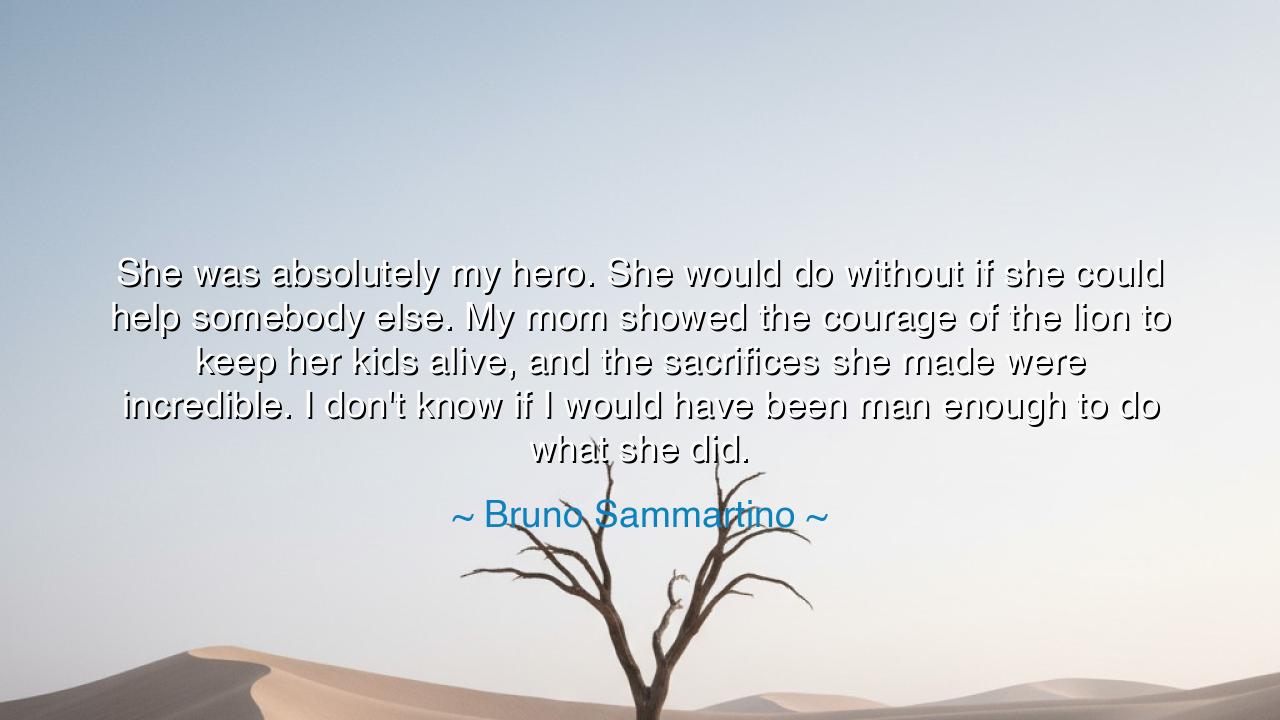
She was absolutely my hero. She would do without if she could
She was absolutely my hero. She would do without if she could help somebody else. My mom showed the courage of the lion to keep her kids alive, and the sacrifices she made were incredible. I don't know if I would have been man enough to do what she did.






The legendary strongman Bruno Sammartino, revered not only for his feats of strength but for the depth of his heart, once spoke these immortal words: “She was absolutely my hero. She would do without if she could help somebody else. My mom showed the courage of the lion to keep her kids alive, and the sacrifices she made were incredible. I don't know if I would have been man enough to do what she did.” In these words, we hear not the boast of a champion, but the reverence of a son. Bruno, who conquered arenas and inspired nations, bows in awe before the quiet greatness of his mother. His tribute reveals a universal truth: that true heroism is not born on battlefields or stages, but in kitchens, in fields, in the humble spaces where love, sacrifice, and courage are lived daily, unseen and uncelebrated.
The origin of these words lies in the crucible of suffering. Born in Italy during the Second World War, young Bruno and his family endured famine, fear, and persecution. His mother, Emilia Sammartino, shielded her children from starvation and Nazi brutality in the mountains of Abruzzo. She risked her life, sneaking down the slopes at night to steal or barter for scraps of food, knowing that capture meant death. Yet she never faltered. In those dark days, when despair hung over Europe like a storm, Emilia’s courage burned as a beacon of defiance and hope. When Bruno later became a symbol of physical power, he understood that his strength was inherited—not of muscle, but of spirit—from a woman whose lionhearted love defied every hardship.
In the ancient world, poets would have called such a woman a goddess, a warrior-mother whose sacrifice sustained the generations. For the ancients knew that motherhood itself is an act of heroism—a daily battle fought not with sword or shield, but with endurance, compassion, and faith. Bruno’s words remind us that true courage is often quiet, unseen, and enduring. The lion’s courage is not only in the roar, but in the fierce protection of the helpless. Emilia’s bravery was not the sudden blaze of a warrior, but the slow, steadfast fire that refused to go out, even in the darkness of war.
History too bears witness to such women. Recall Nancy Wake, the “White Mouse” of the French Resistance, who smuggled hundreds of lives to safety under the shadow of the Nazi regime. Or Sojourner Truth, who, though born in bondage, carried within her the flame of freedom and became a voice for justice that could not be silenced. Like Bruno’s mother, these women did not seek glory. They simply did what love demanded. And through that love, they transcended the ordinary—they became heroes not by title, but by sacrifice.
Bruno’s confession—“I don’t know if I would have been man enough to do what she did”—is not humility alone, but revelation. It shows that strength is not a matter of flesh, but of heart. The world measures power in force and fame, yet the truest power is that of endurance—the will to keep going when no one sees, to give when nothing remains, to love when life gives no reason to. His mother’s courage was born of necessity, yet it became divine through choice: the choice to suffer so that others might live. Such love is the closest we come to the eternal, for it mirrors the selflessness that has moved the heavens since time began.
Let this teaching be passed down through the ages: honor those who endure in silence. Do not look for heroes only among the crowned and celebrated. Look instead to the hands that labor, to the hearts that sacrifice, to the souls that refuse to yield. Remember that greatness often wears the face of humility. The mother, the teacher, the caretaker—these are the quiet titans upon whose shoulders the world rests. Their deeds may not echo in history’s halls, but they resound in eternity.
And so, my child, take to heart the wisdom of Bruno Sammartino’s reverence. If you wish to live nobly, learn from such examples. Be generous, even when you have little. Be brave, even when you are afraid. Protect the weak, nurture the good, and find your courage not in applause, but in love. For when your life becomes an offering to others, you too will bear the courage of the lion—and the heavens themselves will call you hero.
Thus, from the quiet strength of a mother was born the spirit of a champion. And through his words, we are reminded that sacrifice is the highest form of power, and that all true greatness begins with love.






AAdministratorAdministrator
Welcome, honored guests. Please leave a comment, we will respond soon